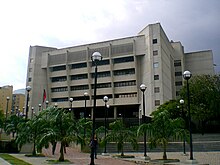This is an old revision of this page, as edited by Tom.Reding (talk | contribs) at 05:16, 12 June 2016 (Fix Category:Pages using citations with accessdate and no URL when perm identifier present (doi|bibcode|arxiv|pmid|jstor|isbn|issn|lccn|oclc|ismn|hdl) (rem access-date) using AWB). The present address (URL) is a permanent link to this revision, which may differ significantly from the current revision.
Revision as of 05:16, 12 June 2016 by Tom.Reding (talk | contribs) (Fix Category:Pages using citations with accessdate and no URL when perm identifier present (doi|bibcode|arxiv|pmid|jstor|isbn|issn|lccn|oclc|ismn|hdl) (rem access-date) using AWB)(diff) ← Previous revision | Latest revision (diff) | Newer revision → (diff)| Supreme Tribunal of Justice Tribunal Supremo de Justicia | |
|---|---|
 TSJ building in Caracas TSJ building in Caracas | |
| Location | Caracas |
| Authorised by | Constitution of Venezuela |
| Website | Official website |
| President | |
| Currently | Gladys María Gutiérrez Alvarado |
The Supreme Tribunal of Justice (Template:Lang-es or TSJ) is the highest court of law in the Bolivarian Republic of Venezuela and is the head of the judicial branch.
The Supreme Tribunal may meet either in specialized chambers (of which there are six: constitutional, political/administrative, electoral, civil, criminal, and social) or in plenary session. Each chamber has five judges, except the constitutional, which has seven. Its main function is to control, according to the constitution and related laws, the constitutionality and legality of public acts.
The Supreme Tribunal's 32 justices (magistrados) are appointed by the National Assembly and serve non-renewable 12-year terms. Appointments are made by a two-thirds majority, or a simple majority if efforts to appoint a judge fail three times in a row. Under article 265 of the 1999 Constitution, judges may be removed by a two-thirds majority of the National Assembly, if the Attorney General, Comptroller General, and Human Rights Ombudsperson have previously agreed a "serious failure" and suspended the judge accordingly.
History
The Tribunal was created under the 1999 Constitution of Venezuela, replacing the Supreme Court of Venezuela. For some years provisional statutes regulated the number of judges - initially 20, with three in each chamber except the constitutional, which had five - and their selection. The statutes were replaced in 2004 by an "organic law" (a law required to clarify constitutional provisions). The law also permitted the National Assembly to revoke the appointment of a judge, by a simple majority, where a judge had provided false information as to his/her credentials.
Criticisms
Venezuela's judicial system has been deemed the most corrupt in the world by Transparency International in 2014. Human Rights Watch claimed that in 2004, Hugo Chávez and his allies took over of the Supreme Tribunal of Justice, filling it with supporters of Chávez and made new measures so the government could dismiss justices from the court. In 2010, legislators from Chávez’s political party appointed 9 permanent judges and 32 stand-ins, which included several allies. They claim that some judges may face reprisals if they rule against government interests.
It has also been alleged that the Supreme Tribunal of Justice with the majority supporting Chávez elected officials to the supposedly non-partisan National Electoral Council of Venezuela (CNE) despite the 1999 Constitution stating that the National Assembly of Venezuela were to perform the action. This resulted with the CNE board having a majority consisting of Chavistas.
References
- ^ Venezuelanalysis, 17 May 2004, “The Venezuelan Judicial System always was the Cinderella of the State Powers”
- "CORRUPTION BY COUNTRY / TERRITORY: VENEZUELA". Transparency International. Retrieved 26 February 2014.
- "World Report 2012: Venezuela". Report. Human Rights Watch. Retrieved 18 March 2014.
- ^ Hawkins, Kirk A. (2010). Venezuela's Chavismo and populism in comparative perspective (1. publ. ed.). New York: Cambridge University Press. ISBN 9780521765039.
External links
| Supreme Courts of South America | |
|---|---|
| Sovereign states | |
| Landmarks of Caracas | ||
|---|---|---|
| Museums |
|  |
| Religion | ||
| Culture and sport | ||
| Government | ||
| Public art |
| |
| Other |
| |
This government-related article is a stub. You can help Misplaced Pages by expanding it. |